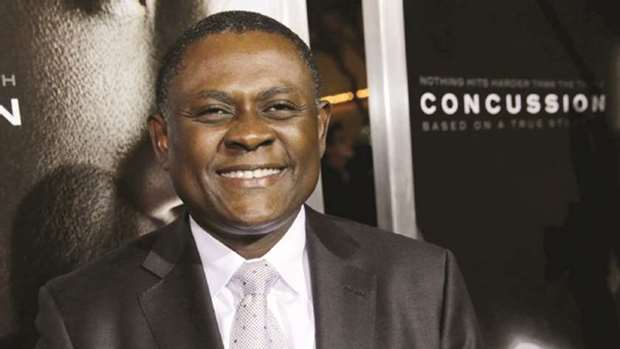Bennet Omalu’s autobiography tells the complete story of how the Nigeria-born
pathologist discovered brain damage in football players — what is now
referred to as chronic traumatic encephalopathy
If you saw the film Concussion, starring Will Smith, you know that Bennet Omalu is the unlikely figure who rocked the foundation of the National Football League and all of football with his scientific research.
Omalu’s autobiography tells the complete story of how the Nigerian-born pathologist discovered brain damage in football players — what now is referred to as chronic traumatic encephalopathy. The first part deals with Omalu’s difficult journey to the United States, an interesting story in its own right. But the core of the book begins in 2002 when Omalu, living in Pittsburgh, was assigned to perform an autopsy on Mike Webster, the former Steelers Hall of Fame centre who descended into depression and homelessness after retiring.
Omalu, who was not familiar with football and Webster, examined his brain to get more answers. His alarming discovery that Webster was suffering from CTE turned Omalu’s life upside down. Omalu details how the mighty NFL tried to debunk his findings and how he was ostracised by many medical experts. Several times, he writes, “I wished I never met Mike Webster.”
Omalu, though, eventually was vindicated, as the league finally had to admit it had a big problem. The last part of the book centres on Omalu’s views on the dangers of the sport. It is recommended reading for parents who are thinking of allowing their children to play football.
The Streak by John Eisenberg is another worthy work
Few individual sports records captured the nation’s attention more than Cal Ripken Jr.’s breaking Lou Gehrig’s mark for consecutive games played. President Bill Clinton and Vice President Al Gore were in attendance when Ripken played in his 2,131st game in 1995, eclipsing Gehrig’s record.
Eisenberg chronicles Ripken’s entire streak, which eventually stretched to 2,632 games. He also details Gehrig’s long run, which tragically ended when “The Iron Horse” was struck by amyotrophic lateral sclerosis in 1939. Eisenberg compares the difficulty of their streaks, examining various factors like travel, medical advances and even the media. Yet the book isn’t just about Ripken and Gehrig. Eisenberg also includes interesting profiles on baseball’s other Iron Men, including the Cubs’ Billy Williams, who set what was a National League record by playing in 1,117 games (Steve Garvey eventually broke it with 1,207 games).
While the durability of these players is lauded, the book does a nice job of questioning whether they hurt their teams by never taking a day off, especially during a slump. Were they being selfish in the name of preserving a streak? “Would occasional rest have made Ripken or Gehrig more productive?” Eisenberg writes. “Who knows? The benefit of a day off is one of baseball’s enduring mysteries.” Ripken felt otherwise, contending the Orioles benefited from his being in the lineup every day. It’s hard to argue against his Hall of Fame record.
The First Major by John Feinstein also does a great job of bringing back focus.
Feinstein, the most prolific sports book writer of this generation, mines a familiar subject with his latest effort: golf. His A Good Walk Spoiled is considered a golf classic, and he also has written books focusing on the game’s biggest tournaments.
Feinstein follows the same template in breaking down the 2016 Ryder Cup at Hazeltine Country Club, in Minnesota. On paper, Feinstein didn’t have a dramatic event to document. The United States took a resounding 17-11 victory over the Europeans.
But that didn’t get in the way of Feinstein’s delivering another compelling book. For him, it is all about the backstory. In fact, he doesn’t start to describe the matches until Page 234. Feinstein’s talent always has been the depth of his relationships, which enables him to get important figures to divulge intimate details of what transpired.
Much of the book focuses on the Americans’ long struggles in the Ryder Cup (winning only two of the previous 10 matches) and how the team’s blowing a big lead Sunday in 2012 at Medinah led to a complete dysfunctional meltdown in 2014 in Scotland.
Feinstein writes about why Davis Love III, the losing captain in 2012, was given another shot to rectify his errors in 2016. The book features one interesting anecdote after another, including inside reaction to controversial statements by Phil Mickelson; how an injured Tiger Woods swallowed his ego to play a supporting role as an assistant captain; and more.
In the hands of a lesser writer, a book about a lopsided match would have been hard to pull off. Feinstein, though, knows how to tell a good story, regardless of the outcome.
— Chicago Tribune/TNS
Bennet Omalu’s alarming discovery that former Steelers Hall of Fame player Mike Webster, left, was suffering from CTE turned Omalu’s life upside down. Omalu details how the mighty NFL tried to debunk his findings and how he was ostracised by many medical experts. Omalu, though, eventually was vindicated, as the league finally had to admit it had a big problem

CANDID: Several times, Bennet Omalu writes, u201cI wished I never met Mike Webster (former Steelers Hall of Fame centre Mike Webster whose case nearly brought him down).u201d
